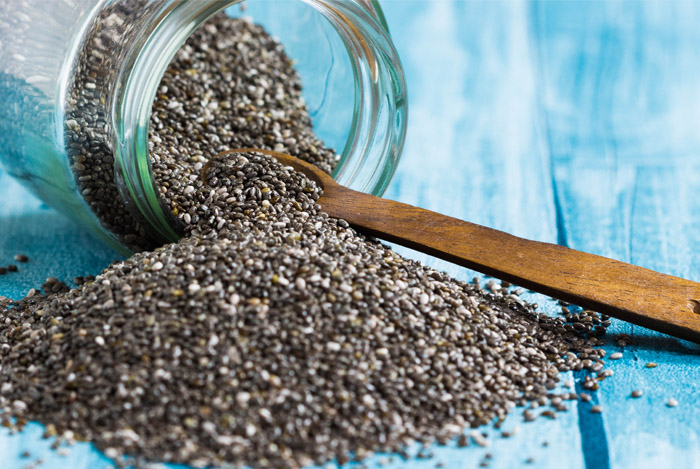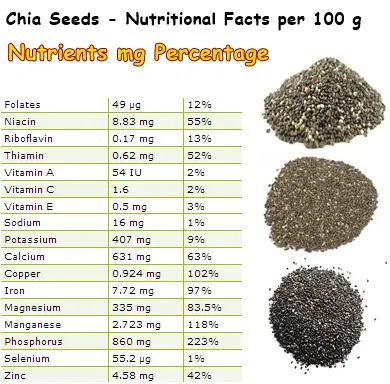The health Benefits of Chia.
Chia seeds were first cultivated over 4,000 years ago in South and Central America. The seed was grown as a food crop for energy, endurance and wellbeing.
Highly prized by the Aztec Emperors, chia was used as currency, and given as religious offerings and used at burial ceremonies.
Ancient civilisations believed that chia seeds provided supernatural powers, and in Mayan the word 'chia' means strength. For a while this ancient grain disappeared from general use, but resurfaced in Argentina as a result of cultivation. Today Australia is fast becoming the main producer of chia.
More recently chia is acknowledged for an array of vitamins, minerals and amino acids but, what sets this little beauty apart from other foods is that it packs a whopping 20% protein.
Considered a modern day superfood, chia can help with weight control, improve digestion, benefit heart health and provide energy.
Digestion
Chia seeds absorb up to twelve times their weight in water, forming a gel capsule known as mucilage, this gel soothes gut inflammation, while the high fibre content helps to gently cleanse the colon, which helps to improve nutrient. The combination of these also help to reduce constipation naturally.
Weight loss
Chia seeds are low in carbohydrates, but high in protein, this protein helps weight loss by suppressing ghrelin, the hunger hormone. The fibre in chia seeds also aids weight loss by absorbing water and through expansion in the stomach, increasing the sensation of fullness and slowing down the rate of absorption.
Energy
The complex carbohydrates in chia break down slowly into sugar, preventing sugar spikes; in turn this steadily releases slow-burning glucose for prolonged energy. In addition, their low glycaemic index helps to regulate blood sugar levels.
Omega-3
Chia seeds are a rich source of omega-3 fatty acids, particularly the alpha linolenic acid (ALA). Which helps with the reduction of joint inflammation, healthy brain functioning, hormone balance, heart health, circulation and cholesterol reduction.
Heart health
The fibre and omega-3's found in chia helps to reduce inflammation, additional benefits include a reduction in cholesterol and triglyceride levels, improved endothelial function, a reduction in artery plaque and a lowering of blood pressure. It is fair to say chia seeds offer an all round benefit to cardiovascular health.
What is the nutrient content of chia seeds?
A quick look at some of the vitamins and minerals and the role they play in our health.
Phosphorus - Mineral
- Maintains healthy cell function
- Helps in maintaining healthy strong bones
- Helps to release energy from food
- Promotes a healthy acid-base balance
- Helps to facilitate digestion
- Helps in the synthesis of protein
Manganese - Mineral
- Supports the formation of healthy bones through absorption of calcium
- Supports collagen production
- Helps with blood sugar control
- Contributes to the prevention of oxygen related damage and damage from ultra violet (UV) light
- Antioxidant, fights free radical damage. Diets low in manganese have been linked to skin problems and asthma
- Proper functioning of the thyroid gland
- Promotes metabolism of fats and carbohydrates.
Copper - Mineral
- Helps to maintain blood volume
- Produces energy in your cells from carbohydrates
- Supports the building of strong tissue, including hair and nails
- Involved in the manufacturing of collagen
- Helps to maintain a healthy balance of cholesterol
- Assists in the prevention of premature ageing.
Magnesium - Mineral
- Helps protein synthesis
- Supports the nervous system
- Improves cellular metabolism
- Regulates heart rhythm
- Reduces the risk of osteoporosis
- Reduces eclamptic seizures
- Helps with muscle relaxation
- Assists with bone and teeth formation
- Regulates the body's use of calcium and other minerals
- Helps maintain structural health of cell membranes
- Reduces the risk of type two diabetes
- Reduces the symptoms of asthma
Iron - Mineral
- Formation of red blood cells
- Supports healthy muscle function
- Helps in brain development
- Helps to regulate body temperature
- Supports a healthy neurological system
- Oxygen carrier.
Calcium - Mineral
- Maintains healthy bones
- Regulates acid-base balance
- Helps with maintaining healthy muscle and nerve function
- Helps in the transportation of nutrients
Thiamine - Vitamin B1
- Helps to metabolise carbohydrates, fats and proteins
- Supports the normal functioning of the nervous system
- Helps to turn carbohydrates into energy
- Promotes normal brain functioning
- Helps maintain a healthy digestion
- Supports the proper functioning of muscles
- Antioxidant
- Slows down the progression of Alzehimer's Disease.
Zinc - Mineral
- Supports a healthy immune system
- Promotes healthy, clear skin
- Helps to maintain vision and works well with vitamin A
- Promotes a healthy male reproduction system
- Can aid in the prevention of eczema
- Supports a healthy sense of smell and taste
- Supports weight loss by suppressing appetite
- Essential for repair and function of DNA





 Organically Pure
Organically Pure 
 Reply With Quote
Reply With Quote
